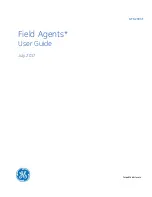
www.ti.com
2.4
Ethernet Protocol Overview
2.4.1
Ethernet Frame Format
Preamble
SFD
Destination
Source
Len
Data
7
1
6
6
2
46−1500
4
FCS
Number of bytes
Legend: SFD=Start Frame Delimeter; FCS=Frame Check Sequence (CRC)
Architecture
Ethernet provides an unreliable, connection-less service to a networking application. A brief overview of
the Ethernet protocol is given in the following subsections. For in-depth information on the Carrier Sense
Multiple Access with Collision Detection (CSMA/CD) Access Method, which is the Ethernet’s multiple
access protocol, see the IEEE 802.3 standard document.
All the Ethernet technologies use the same frame structure. The format of an Ethernet frame is shown in
Figure 4
and described in
Table 3
. The Ethernet packet, which is the collection of bytes representing the
data portion of a single Ethernet frame on the wire, is shown outlined in bold. The Ethernet frames are of
variable lengths, with no frame smaller than 64 bytes or larger than RXMAXLEN bytes (header, data, and
CRC).
Figure 4. Ethernet Frame Format
Table 3. Ethernet Frame Description
Field
Bytes
Description
Preamble
7
Preamble. These 7 bytes have a fixed value of 55h and serve to wake up the receiving
EMAC ports and to synchronize their clocks to that of the sender’s clock.
SFD
1
Start of Frame Delimiter. This field with a value of 5Dh immediately follows the preamble
pattern and indicates the start of important data.
Destination
6
Destination address. This field contains the Ethernet MAC address of the EMAC port for
which the frame is intended. It may be an individual or multicast (including broadcast)
address. When the destination EMAC port receives an Ethernet frame with a destination
address that does not match any of its MAC physical addresses, and no promiscuous,
multicast or broadcast channel is enabled, it discards the frame.
Source
6
Source address. This field contains the MAC address of the Ethernet port that transmits the
frame to the Local Area Network.
Len
2
Length/Type field. The length field indicates the number of EMAC client data bytes
contained in the subsequent data field of the frame. This field can also be used to identify
the type of data the frame is carrying.
Data
46 to
Data field. This field carries the datagram containing the upper layer protocol frame, that is,
(RXMAXLEN - 18)
IP layer datagram. The maximum transfer unit (MTU) of Ethernet is (RXMAXLEN - 18)
bytes. This means that if the upper layer protocol datagram exceeds (RXMAXLEN - 18)
bytes, then the host has to fragment the datagram and send it in multiple Ethernet packets.
The minimum size of the data field is 46 bytes. This means that if the upper layer datagram
is less then 46 bytes, the data field has to be extended to 46 bytes by appending extra bits
after the data field, but prior to calculating and appending the FCS.
FCS
4
Frame Check Sequence. A cyclic redundancy check (CRC) is used by the transmit and
receive algorithms to generate a CRC value for the FCS field. The frame check sequence
covers the 60 to (RXMAXLEN - 4) bytes of the packet data. Note that this 4-byte field may
or may not be included as part of the packet data, depending on how the EMAC is
configured.
SPRUEQ6 – December 2007
Ethernet Media Access Controller (EMAC)/Management Data Input/Output (MDIO)
19
Submit Documentation Feedback















































